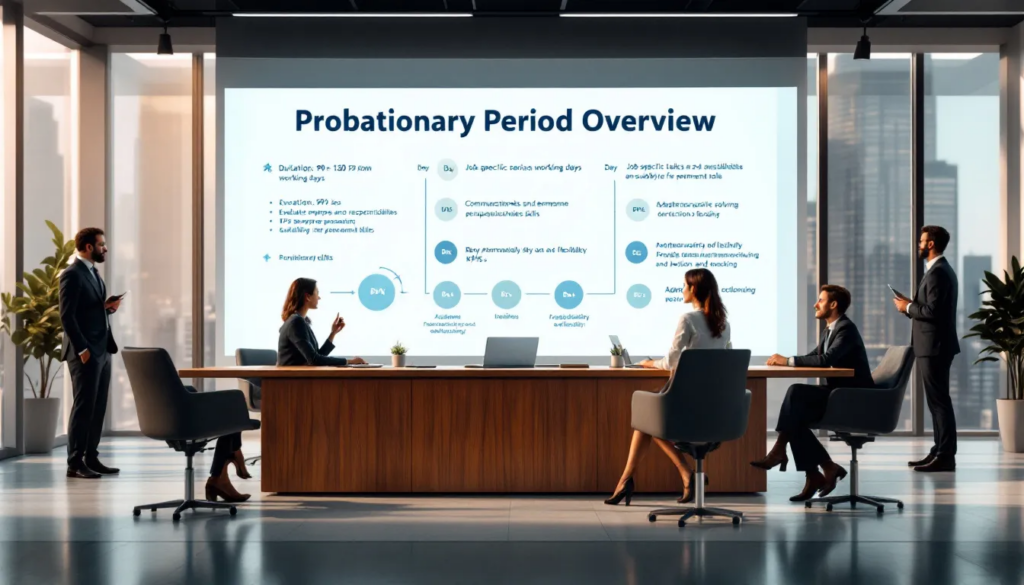The federal employment probationary period tests new federal probationary employees before granting them permanent status. This article breaks down what to expect, including your rights and the key steps to successfully complete this phase.
Key Takeaways
- The federal probationary period acts as a trial for new hires, typically lasting one year, but can be longer based on position and circumstances.
- Probationary employees have limited rights, facing easier termination processes, but they do have protections against discrimination and retaliation.
- Frequent feedback and clear communication from managers are key for probationary employees to succeed and transition to permanent roles.
Defining the Federal Employment Probationary Period

The federal employment probationary period acts as a trial for new federal employees in the federal workforce, evaluating their performance to ensure they meet the criteria for permanent employment. This assessment often includes evaluating technical skills, adaptability, cultural fit, and work ethic.
Probationary periods apply to both new hires and seasoned professionals transitioning to government roles, including those entering the Senior Executive Service. This means that even if you have prior federal service, you might still face a probationary period in your new position. Employees in both competitive service and excepted services are required to undergo these trial periods, which come with distinct rights and expectations.
Interestingly, if you transfer to another agency, you may be able to combine your previous probationary period with the new one, provided there’s a break in service of less than 30 days. However, some federal positions might have prolonged probationary or trial periods lasting up to two or even three years under unique circumstances.
Duration and Timing: How Long is the Probationary Period?

Typically, the duration of the federal probationary period is one year probationary period. However, this can vary depending on the nature of the position and specific circumstances. For example, some positions may require a probationary period of up to two years or even longer.
Leave types and absences can influence the probationary period’s length. Generally, military service is excluded, but exceptions exist. Officially, probationary periods end the day before the anniversary date of your duty completion.
If you’re transferring between agencies, you may count your incomplete probation time toward the new position’s requirement. The length of the trial period for new hires in the excepted service varies, so always check with your HR department for specifics.
Rights and Protections During the Probationary Period

As a probationary employee, you may find that your rights are more limited compared to your full-time counterparts. For instance, federal agencies can terminate probationary employees with minimal explanation, often with immediate effect. This is why understanding your rights and protections is crucial during this period.
While probationary employees usually have limited rights to appeal terminations, exceptions exist. For instance, terminations perceived as politically motivated or involving prohibited personnel practices can be appealed through the Office of Special Counsel or the Equal Employment Opportunity Commission. Additionally, individuals with prior service may retain full statutory rights, offering exceptions to general appeal limitations.
Discrimination and retaliation protections are also in place for probationary employees. While these protections are limited, they do exist and can be crucial in safeguarding your rights. We will delve deeper into these protections in the following subsections.
Discrimination Protections
Federal law prohibits discrimination against probationary employees based on race, gender, disability, and other protected characteristics. This means that even during your probationary period, you are entitled to a workplace free from discrimination.
Probationary employees are entitled to protections against discrimination during their employment. If you face discrimination, you have the right to challenge it through appropriate channels, such as the Equal Employment Opportunity Commission (EEOC).
Discrimination can take many forms, including unfair treatment based on race, color, religion, sex, national origin, age, disability, or genetic information. Knowing your rights and the avenues for recourse can empower you to take action if you experience such issues.
Retaliation Protections
Retaliation protections are equally important for probationary employees. While you have limited rights and protections during your probationary period, you are safeguarded against retaliation for exercising your rights. These protections cover a range of activities, including reporting discrimination, whistleblowing, and asserting your legal rights.
If you face retaliation for these actions, it is crucial to seek legal assistance or union representation to navigate the situation effectively. Remember, protections against discrimination based on race, gender, age, and other factors are critical for probationary employees.
Knowing your protections can empower you to confidently stand up for your rights.
The Role of Feedback and Evaluations

Regular feedback is a cornerstone of a successful probationary period. Probationary employees should receive frequent feedback to help them meet performance expectations. This feedback can be informal or part of scheduled reviews but should occur often to support probationary employees.
Managers must clearly communicate expectations to help probationary employees succeed. Regular performance assessments ensure timely feedback and intervention, while periodic assessment reminders help supervisors track progress.
Timely evaluations help probationary employees understand their performance and areas needing improvement. Providing both positive and corrective feedback guides them through their initial employment phase. Supervisors should document strengths and weaknesses throughout the evaluation period.
Agency Responsibilities and Best Practices
Federal agencies have a crucial role in supporting probationary employees. A federal agency is responsible for providing training, support, and guidance to ensure employees have the resources needed for success. Establishing clear performance expectations helps probationary employees understand their roles better.
Agencies should offer adequate training and resources to support employees during their probationary period and clearly communicate performance expectations to ensure standards are met.
Close supervision and instruction from managers help support probationary employees’ development during the initial months. Timely action is essential for terminating unsuitable employees before the probation period ends.
Successfully Completing the Probationary Period

Successfully navigating the probationary period requires proactive behavior and seeking feedback. Regular feedback ensures expectations are clear and provides a fair opportunity to demonstrate competence.
Being proactive in asking questions and clarifying expectations is key to success during the probationary period. Employment can be terminated if a probationary employee is not a good fit for the job.
At the end of the probationary period, employees who meet expectations transition into permanent roles. However, the agency may choose to terminate employment if there are conduct or performance issues when the probationary period ends.
Legal Considerations and When to Seek Help
Tip #1: Probationary employees generally have limited appeal rights and can be terminated with minimal procedural requirements. Typically, they cannot appeal their termination, a restriction that applies to the Merit Systems Protection Board (MSPB).
Tip #2: However, probationary employees can file complaints alleging discrimination based on marital status, political affiliation, or retaliation. They are also protected from retaliation for whistleblowing or asserting their legal rights.
Tip #3: If you’re uncertain about your rights or facing significant employment issues, seeking legal advice or union representation is advisable. Knowing when to seek help can significantly impact protecting your rights and navigating challenges effectively.
Recent Changes and Future Trends in Federal Probationary Periods
Recent legislative changes have affected probationary periods, with some advocating for longer durations to improve hiring decisions. Additionally, there are calls for stronger appeal rights for probationary employees, highlighting the need for better protections during their initial employment period.
Tip #4: With several hundred thousand probationary employees potentially being fired in 2025, understanding these changes is crucial. Agencies must provide written notice explaining reasons and the effective date of termination before proceeding with termination.
Tip #5: Legislative updates could significantly impact probationary employment, so staying informed about these changes is crucial for new federal employees under federal employment law and the federal government.
Summary
In summary, understanding your rights and protections during the federal employment probationary period is crucial. From knowing the duration and timing to understanding your limited appeal rights and protections against discrimination and retaliation, this guide has covered key aspects to help you navigate this critical phase. Armed with this knowledge, you can confidently manage your probationary status and set yourself up for long-term success in the federal workforce.
Frequently Asked Questions
How long is the typical federal probationary period?
Tip #6: The typical federal probationary period is usually one year, but it can be extended for some positions or special situations.
Can probationary employees appeal their termination?
Tip #7: Probationary employees usually can’t appeal their termination, but if they believe they faced discrimination or a violation of procedures, they may have grounds to challenge it. It’s worth checking your specific company’s policy, though!
Are probationary employees protected against discrimination?
Tip #8: Absolutely, probationary employees are protected against discrimination just like any other employees, so they can’t be treated unfairly because of their race, gender, or disability.
What should probationary employees do if they face retaliation?
Tip #9: If you’re facing retaliation as a probationary employee, it’s best to seek legal help or talk to your union representative to handle it properly. They can guide you through your options and protect your rights.
How can probationary employees ensure they meet performance expectations?
Tip #10: To meet performance expectations, probationary employees should actively seek regular feedback and clarify their roles. This proactivity shows commitment and helps them stay on track.



